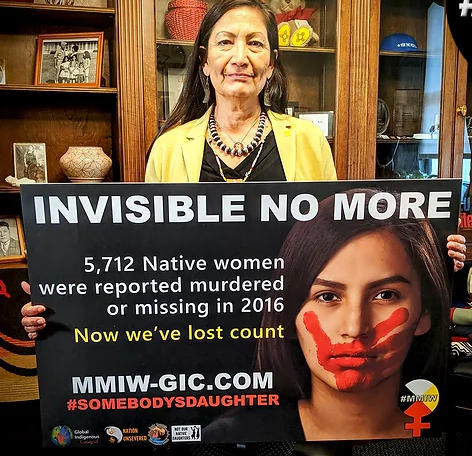
- Details
- By Native News Online Staff
#MMIP: To recognize, Missing and Murdered Indigenous Persons Awareness Day, on Thursday May 5, Secretary of the Interior Deb Haaland (Laguna Pueblo) and Deputy Attorney General Lisa Monaco will host a virtual event to highlight the Not Invisible Act Commission.
The Departments of the Interior and Justice are working to implement the Not Invisible Act, sponsored by Secretary Haaland during her time in Congress. The law established the Not Invisible Act Commission, a cross jurisdictional advisory committee composed of law enforcement, tribal leaders, federal partners, service providers, family members of missing and murdered individuals, and most importantly — survivors.
In addition to Secretary Haaland and Deputy Attorney General Monaco, the event will feature three panelists who will discuss the Missing and Murdered Indigenous Peoples crisis and the importance of the Not Invisible Act Commission in the collaborative efforts to address the crisis.
Whitney Gravelle, Chairwoman, Bay Mills Indian Community
Fawn Sharp, President, National Congress of American Indians
Lucy Rain Simpson, Executive Director, National Indigenous Women’s Resource Center
The live event will begin at 2:30 PM ET on Thursday, May 5. Members of the public may view the event at the Interior Department’s website.
More Stories Like This
Native News Weekly (August 25, 2024): D.C. BriefsCadiz, Inc. Announces EPA Selection of Mojave Groundwater Bank Northern Pipeline Project for WIFIA Loan Application
Jesse Jackson, Who Bridged Civil Rights Struggles for Blacks and Native Americans, Dies at 84
SAVE THE DATE: GVSU’s “Celebrating All Walks of Life” Powwow Set for April 4th
Monday Morning: (February 16, 2026): Articles You May Have Missed This Past Weekend
Help us defend tribal sovereignty.
At Native News Online, our mission is rooted in telling the stories that strengthen sovereignty and uplift Indigenous voices — not just at year’s end, but every single day.
Because of your generosity last year, we were able to keep our reporters on the ground in tribal communities, at national gatherings and in the halls of Congress — covering the issues that matter most to Indian Country: sovereignty, culture, education, health and economic opportunity.
That support sustained us through a tough year in 2025. Now, as we look to the year ahead, we need your help right now to ensure warrior journalism remains strong — reporting that defends tribal sovereignty, amplifies Native truth, and holds power accountable.
 The stakes couldn't be higher. Your support keeps Native voices heard, Native stories told and Native sovereignty defended.
The stakes couldn't be higher. Your support keeps Native voices heard, Native stories told and Native sovereignty defended.
Stand with Warrior Journalism today.
Levi Rickert (Potawatomi), Editor & Publisher

